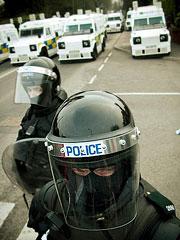
As part of the ongoing survey of police forces in the Celtic countries the PSNI has been queried about language and cultural commitment. The Celtic League General Secretary has posed a similar series of questions to those already addressed to police forces in Scotland, Wales, Ireland, Cornwall and Mann.
The GS has also sought clarification as to why after what was described as a "new beginning to policing" the PSNI still has a policy of all officers carrying firearms (unlike in other police services in the Celtic countries where specialist firearms response units are used).
See below:
"Sir Hugh Stephen Orde Chief Constable Police Service of Northern Ireland (PSNI) PSNI Headquarters Brooklyn 65 Knock Road Belfast BT5 6LE
Tel 0845 600 8000 E-mail: info [at] ...
Dear Chief Constable Hugh Stephen Orde
PSNI: Irish language and cultural commitment
The Celtic League is currently pursuing a campaign to examine how the police forces in the Celtic countries reflect the respective distinctive Celtic cultural and linguistic heritage in each nation/territory.
As part of the first phase of our survey the Celtic League wrote to all the Chief Constables of Wales, Scotland, Isle of Man and Cornwall inviting them to offer their opinions and views on particular aspects of their forces' commitment to the distinctive Celtic language and culture that is to be found in whole or in part of the territory that their police force serve. We have so far received a very positive response to our survey and have been generally happy with the dialogue that we have been engaged in about the above topic with several police forces.
At our AGM in Dublin in August 2008 we discussed this first phase of our police survey and debated some of the issues that we should pursue as part of our second phase, which would involve the police forces in the Republic of Ireland, the North of Ireland and Brittany. One problematic issue that was addressed in some depth, in relation to the PSNI, was the fact that PSNI is an armed police force.
We are aware that in the past the RUC was armed, because of its "dual role of combating normal crime and armed subversion from the IRA" (as you state on your website). However, the PSNI has been promoted as something different from the RUC and under the Independent Commission on Policing in Northern Ireland was meant to represent "a new beginning to policing". Firstly then we would therefore like to know why the PSNI is still an armed force. We would also like to know if attitudes of the general public in the North of Ireland towards the PSNI carrying guns have been surveyed by the PSNI itself, or another body. If they have, could you please forward us some information regarding this?
As you will agree, we believe this campaign is important, because the police form an important part of the community it serves. We also therefore think that the police should represent and reflect the cultural and linguistic heritage of their community. With this in mind now, could you please try to answer the following questions as fully as possible:
1) Why isn't your new website in Irish and do you have plans to translate the website into Irish in the future?
2) Is there a requirement for your officers to be able to speak some Irish or show a willingness to learn Irish to enter the force? What is the percentage of Irish language speakers working in the PSNI?
3) Are your officers able to attend free classes in Irish as part of their job, should they wish to do so and if not why? If they can attend free language classes, what are the requirements of the course and who manages it?
4) Do you have a specific Irish language policy for your force?
5) If I were to write a letter to the PSNI in Irish, at any level and on any topic, would I receive a reply in that language?
6) Do you try to actively recruit people into the PSNI from the different cultural communities that exist in the North of Ireland and if so, how do you go about this?
7) How could, in your opinion, the PSNI show more of a commitment to Irish cultural and linguistic identity?
We have also copied this letter to the First minister and Deputy First Minister for their information.
Many thanks in advance and we look forward to hearing from you soon.
Yours sincerely
Rhisiart Tal-e-bot General Secretary Celtic League
CC First minister Rt Hon Peter Robinson MP MLA
Deputy Minister Martin McGuinness MP MLA"
Following the questions posed to the PSNI only police services in Brittany remain to be scrutinised by the League.
The first section of the 'Celtic League Police Report" which was presented to the 2008 AGM can be found at:
J B Moffatt Director of Information Celtic League 24/01/09
 The Celtic League has branches in the six Celtic Countries. It works to promote cooperation between these countries and campaigns on a broad range of political, cultural and environmental matters. It highlights human rights abuse, monitors all military activity and focuses on socio-economic issues.
TEL (UK) 01624 877918
MOBILE (UK)07624 491609
(voir le site)
The Celtic League has branches in the six Celtic Countries. It works to promote cooperation between these countries and campaigns on a broad range of political, cultural and environmental matters. It highlights human rights abuse, monitors all military activity and focuses on socio-economic issues.
TEL (UK) 01624 877918
MOBILE (UK)07624 491609
(voir le site)